现在完成时1
- 格式:doc
- 大小:29.00 KB
- 文档页数:2
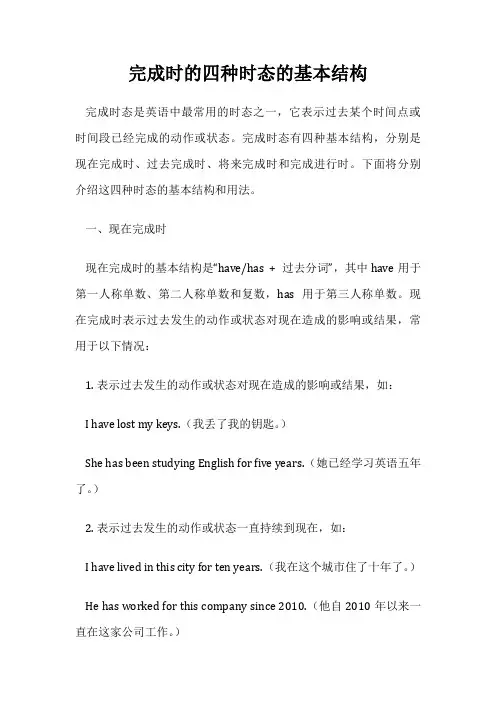
完成时的四种时态的基本结构完成时态是英语中最常用的时态之一,它表示过去某个时间点或时间段已经完成的动作或状态。
完成时态有四种基本结构,分别是现在完成时、过去完成时、将来完成时和完成进行时。
下面将分别介绍这四种时态的基本结构和用法。
一、现在完成时现在完成时的基本结构是“have/has + 过去分词”,其中have用于第一人称单数、第二人称单数和复数,has用于第三人称单数。
现在完成时表示过去发生的动作或状态对现在造成的影响或结果,常用于以下情况:1. 表示过去发生的动作或状态对现在造成的影响或结果,如:I have lost my keys.(我丢了我的钥匙。
)She has been studying English for five years.(她已经学习英语五年了。
)2. 表示过去发生的动作或状态一直持续到现在,如:I have lived in this city for ten years.(我在这个城市住了十年了。
) He has worked for this company since 2010.(他自2010年以来一直在这家公司工作。
)3. 表示过去发生的动作或状态与现在有关联,如:I have just finished my homework.(我刚刚完成了我的作业。
)She has already left for the airport.(她已经去机场了。
)二、过去完成时过去完成时的基本结构是“had + 过去分词”,表示在过去某个时间点或时间段之前已经完成的动作或状态。
过去完成时常用于以下情况:1. 表示过去某个时间点或时间段之前已经完成的动作或状态,如:I had finished my work before he arrived.(他到达之前我已经完成了我的工作。
)She had lived in Paris for two years before she moved to London.(她在搬到伦敦之前在巴黎住了两年。
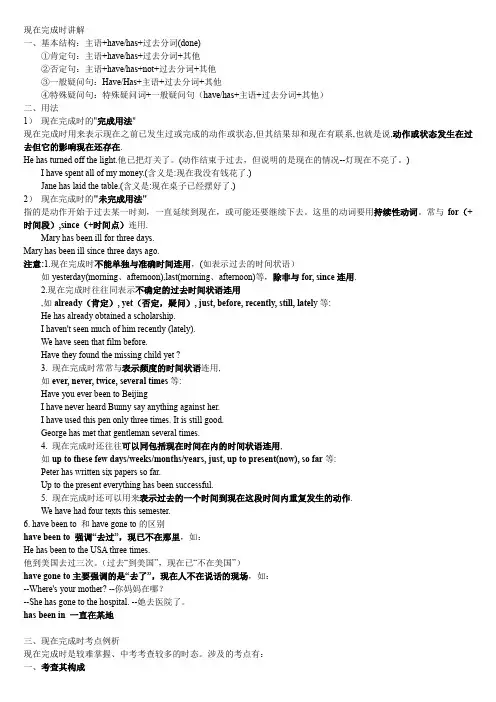
现在完成时讲解一、基本结构:主语+have/has+过去分词(done)①肯定句:主语+have/has+过去分词+其他②否定句:主语+have/has+not+过去分词+其他③一般疑问句:Have/Has+主语+过去分词+其他④特殊疑问句:特殊疑问词+一般疑问句(have/has+主语+过去分词+其他)二、用法1)现在完成时的"完成用法"现在完成时用来表示现在之前已发生过或完成的动作或状态,但其结果却和现在有联系,也就是说,动作或状态发生在过去但它的影响现在还存在.He has turned off the light.他已把灯关了。
(动作结束于过去,但说明的是现在的情况--灯现在不亮了。
)I have spent all of my money.(含义是:现在我没有钱花了.)Jane has laid the table.(含义是:现在桌子已经摆好了.)2)现在完成时的"未完成用法"指的是动作开始于过去某一时刻,一直延续到现在,或可能还要继续下去。
这里的动词要用持续性动词。
常与for(+时间段),since(+时间点)连用.Mary has been ill for three days.Mary has been ill since three days ago.注意:1.现在完成时不能单独与准确时间连用,(如表示过去的时间状语)如yesterday(morning、afternoon),last(morning、afternoon)等,除非与for, since连用.2.现在完成时往往同表示不确定的过去时间状语连用,如already(肯定), yet(否定,疑问), just, before, recently, still, latel y等:He has already obtained a scholarship.I haven't seen much of him recently (lately).We have seen that film before.Have they found the missing child yet ?3. 现在完成时常常与表示频度的时间状语连用,如ever, never, twice, several times等:Have you ever been to BeijingI have never heard Bunny say anything against her.I have used this pen only three times. It is still good.George has met that gentleman several times.4. 现在完成时还往往可以同包括现在时间在内的时间状语连用,如up to these few days/weeks/months/years, just, up to present(now), so far等:Peter has written six papers so far.Up to the present everything has been successful.5. 现在完成时还可以用来表示过去的一个时间到现在这段时间内重复发生的动作.We have had four texts this semester.6. have been to 和have gone to的区别have been to 强调“去过”,现已不在那里,如:He has been to the USA three times.他到美国去过三次。

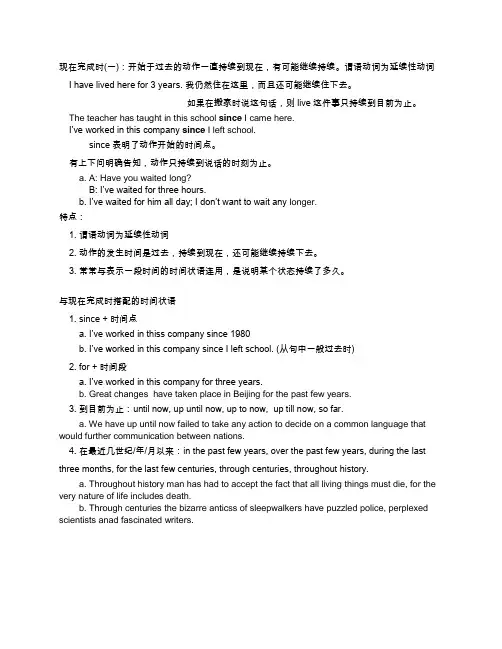
现在完成时(一):开始于过去的动作一直持续到现在,有可能继续持续。
谓语动词为延续性动词 I have lived here for 3 years. 我仍然住在这里,而且还可能继续住下去。
如果在搬家时说这句话,则live这件事只持续到目前为止。
The teacher has taught in this school since I came here.I’ve worked in this company since I left school.since表明了动作开始的时间点。
有上下问明确告知,动作只持续到说话的时刻为止。
a. A: Have you waited long?B: I’ve waited for three hours.b. I’ve waited for him all day; I don’t want to wait any longer.特点:1. 谓语动词为延续性动词2. 动作的发生时间是过去,持续到现在,还可能继续持续下去。
3. 常常与表示一段时间的时间状语连用,是说明某个状态持续了多久。
与现在完成时搭配的时间状语1. since + 时间点a. I’ve worked in thiss company since 1980b. I’ve worked in this company since I left school. (从句中一般过去时)2. for + 时间段a. I’ve worked in this company for three years.b. Great changes have taken place in Beijing for the past few years.3. 到目前为止:until now, up until now, up to now, up till now, so far.a. We have up until now failed to take any action to decide on a common language that would further communication between nations.4. 在最近几世纪/年/月以来:in the past few years, over the past few years, during the last three months, for the last few centuries, through centuries, throughout history.a. Throughout history man has had to accept the fact that all living things must die, for the very nature of life includes death.b. Through centuries the bizarre anticss of sleepwalkers have puzzled police, perplexed scientists anad fascinated writers.现在完成时(二):过去发生但与现在仍有联系的动作或状态a. He has broken his leg. 他现在还在医院,所以不能和同学一起郊游。
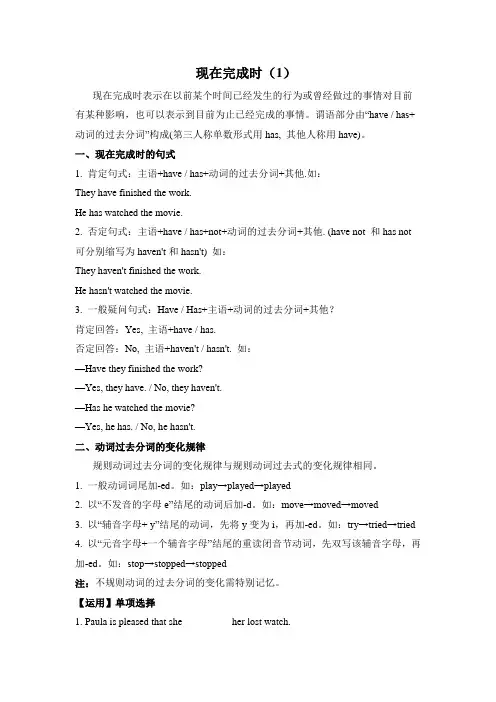
现在完成时(1)现在完成时表示在以前某个时间已经发生的行为或曾经做过的事情对目前有某种影响,也可以表示到目前为止已经完成的事情。
谓语部分由“have / has+动词的过去分词”构成(第三人称单数形式用has, 其他人称用have)。
一、现在完成时的句式1. 肯定句式:主语+have / has+动词的过去分词+其他.如:They have finished the work.He has watched the movie.2. 否定句式:主语+have / has+not+动词的过去分词+其他. (have not 和has not 可分别缩写为haven't和hasn't) 如:They haven't finished the work.He hasn't watched the movie.3. 一般疑问句式:Have / Has+主语+动词的过去分词+其他?肯定回答:Yes, 主语+have / has.否定回答:No, 主语+haven't / hasn't. 如:—Have they finished the work?—Yes, they have. / No, they haven't.—Has he watched the movie?—Yes, he has. / No, he hasn't.二、动词过去分词的变化规律规则动词过去分词的变化规律与规则动词过去式的变化规律相同。
1. 一般动词词尾加-ed。
如:play→played→played2. 以“不发音的字母e”结尾的动词后加-d。
如:move→moved→moved3. 以“辅音字母+ y”结尾的动词,先将y变为i,再加-ed。
如:try→tried→tried4. 以“元音字母+一个辅音字母”结尾的重读闭音节动词,先双写该辅音字母,再加-ed。
如:stop→stopped→stopped注:不规则动词的过去分词的变化需特别记忆。
![现在完成时讲解课件[1]](https://uimg.taocdn.com/9b50b30a4a7302768e9939ab.webp)
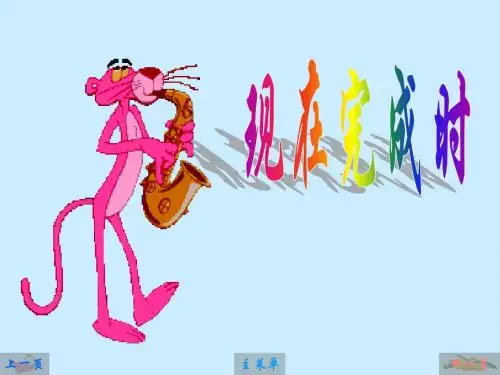
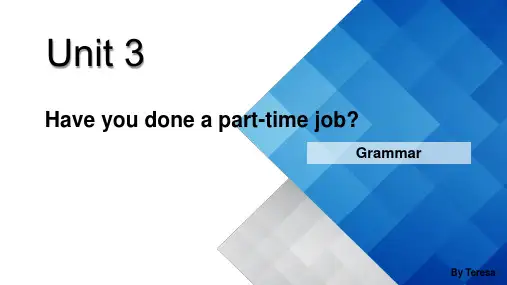
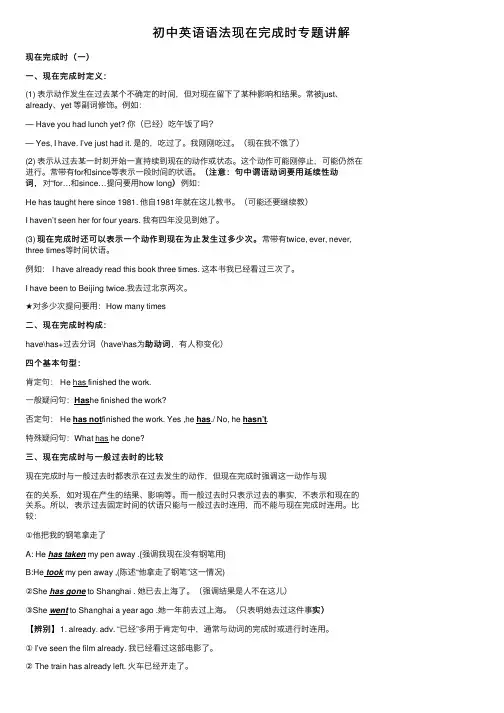
初中英语语法现在完成时专题讲解现在完成时(⼀)⼀、现在完成时定义:(1) 表⽰动作发⽣在过去某个不确定的时间,但对现在留下了某种影响和结果。
常被just、already、yet 等副词修饰。
例如:— Have you had lunch yet? 你(已经)吃午饭了吗?— Yes, I have. I’ve just had it. 是的,吃过了。
我刚刚吃过。
(现在我不饿了)(2) 表⽰从过去某⼀时刻开始⼀直持续到现在的动作或状态。
这个动作可能刚停⽌,可能仍然在(注意:句中谓语动词要⽤延续性动进⾏。
常带有for和since等表⽰⼀段时间的状语。
(注意:句中谓语动词要⽤延续性动词,对“for…和since…提问要⽤how long)例如:词,He has taught here since 1981. 他⾃1981年就在这⼉教书。
(可能还要继续教)I haven’t seen her for four years. 我有四年没见到她了。
现在完成时还可以表⽰⼀个动作到现在为⽌发⽣过多少次。
常带有twice, ever, never, (3) 现在完成时还可以表⽰⼀个动作到现在为⽌发⽣过多少次。
three times等时间状语。
例如: I have already read this book three times. 这本书我已经看过三次了。
I have been to Beijing twice.我去过北京两次。
★对多少次提问要⽤:How many times⼆、现在完成时构成:have\has+过去分词(have\has为助动词助动词,有⼈称变化)四个基本句型:肯定句: He has finished the work.⼀般疑问句:Has he finished the work?否定句: He has not finished the work. Yes ,he has./ No, he hasn’t.特殊疑问句:What has he done?三、现在完成时与⼀般过去时的⽐较现在完成时与⼀般过去时都表⽰在过去发⽣的动作,但现在完成时强调这⼀动作与现在的关系,如对现在产⽣的结果、影响等。
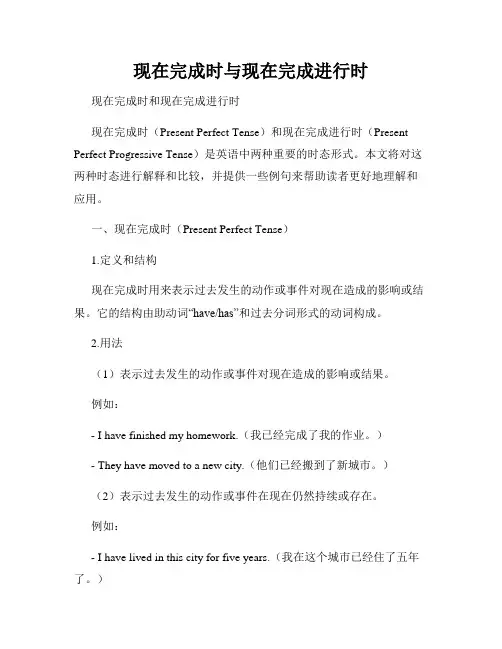
现在完成时与现在完成进行时现在完成时和现在完成进行时现在完成时(Present Perfect Tense)和现在完成进行时(Present Perfect Progressive Tense)是英语中两种重要的时态形式。
本文将对这两种时态进行解释和比较,并提供一些例句来帮助读者更好地理解和应用。
一、现在完成时(Present Perfect Tense)1.定义和结构现在完成时用来表示过去发生的动作或事件对现在造成的影响或结果。
它的结构由助动词“have/has”和过去分词形式的动词构成。
2.用法(1)表示过去发生的动作或事件对现在造成的影响或结果。
例如:- I have finished my homework.(我已经完成了我的作业。
)- They have moved to a new city.(他们已经搬到了新城市。
)(2)表示过去发生的动作或事件在现在仍然持续或存在。
例如:- I have lived in this city for five years.(我在这个城市已经住了五年了。
)- She has known him since childhood.(她从小就认识他。
)(3)表示过去曾经发生过的但时间不明确的动作或事件。
例如:- Have you ever been to Paris?(你曾经去过巴黎吗?)- He has read a lot of books.(他读过很多书。
)3.例句(1)肯定句:- I have seen that movie before.- We have visited the museum many times.- They have already finished their dinner.(2)否定句:- She hasn't finished her work yet.- He hasn't traveled abroad.- They haven't bought a new car.(3)疑问句:- Have you ever been to Japan?- Has she finished her presentation?- Have they seen this movie?二、现在完成进行时(Present Perfect Progressive Tense)1.定义和结构现在完成进行时用来表示发生在过去某段时间内一直持续的动作或事件。
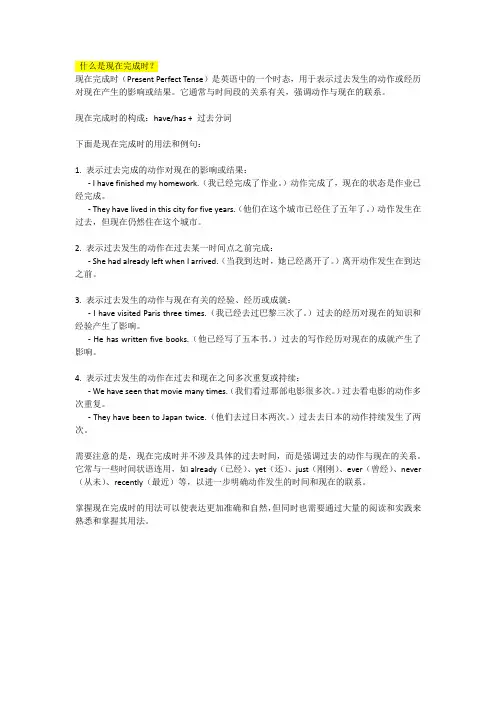
什么是现在完成时?现在完成时(Present Perfect Tense)是英语中的一个时态,用于表示过去发生的动作或经历对现在产生的影响或结果。
它通常与时间段的关系有关,强调动作与现在的联系。
现在完成时的构成:have/has + 过去分词下面是现在完成时的用法和例句:1. 表示过去完成的动作对现在的影响或结果:- I have finished my homework.(我已经完成了作业。
)动作完成了,现在的状态是作业已经完成。
- They have lived in this city for five years.(他们在这个城市已经住了五年了。
)动作发生在过去,但现在仍然住在这个城市。
2. 表示过去发生的动作在过去某一时间点之前完成:- She had already left when I arrived.(当我到达时,她已经离开了。
)离开动作发生在到达之前。
3. 表示过去发生的动作与现在有关的经验、经历或成就:- I have visited Paris three times.(我已经去过巴黎三次了。
)过去的经历对现在的知识和经验产生了影响。
- He has written five books.(他已经写了五本书。
)过去的写作经历对现在的成就产生了影响。
4. 表示过去发生的动作在过去和现在之间多次重复或持续:- We have seen that movie many times.(我们看过那部电影很多次。
)过去看电影的动作多次重复。
- They have been to Japan twice.(他们去过日本两次。
)过去去日本的动作持续发生了两次。
需要注意的是,现在完成时并不涉及具体的过去时间,而是强调过去的动作与现在的关系。
它常与一些时间状语连用,如already(已经)、yet(还)、just(刚刚)、ever(曾经)、never (从未)、recently(最近)等,以进一步明确动作发生的时间和现在的联系。
现在完成时第一关现在完成时I动词过去分词变化规则现在完成时的含义:1.表⽰从过去某⼀事件发⽣到现在或将持续下去。
如: He has taught in our school for 20 years.2.过去发⽣的事情对现在造成的影响。
如: I have spent all my money. 现在完成时的时间状语:1.副词:already, yet, ever, never,2.表⽰到说话为⽌的过去时间状语: just, before, up to now, up till now, in the past/last few year, by now, since, so far.3.表⽰⼀段时间的时间状语:for+⼀段时间,次数。
注意:since 则为介词或从属连接词,其后接名词、动名词或从句,表示从某一特定时间起直至现在或过去某一特定时间为止,依然继续着的事情的开始点,在以此为时间状语的句子中,谓语动词常用完成时。
since 后接时间点,如1993,last term, yesterday, the time I got there过去分词 (规则变化)动词原形后+edwalk- work- fix-mix- 以辅音字母+y 的动词,将y 变成i再加-edcarry-fly-study-以e 结尾的动词直接+ d live- love- 双写结尾字母+ edstop-plan- travel-prefer- 过去分词(不规则变化)keep- sell-lend-spend- burn- bring- catch- break- write- fly-wear- grow- swim- ring- say-sing begin- rise- run- teach-Tipsfor后接一段时间,表示“长达多久”,如ten years, a while, two days等。
过关练习Exercise 1请将下列动词变成过去式和过去分词。
一.核心语法【知识梳理】1.现在完成时【拓展】1)表示过去的动作对现在造成的影响或结果,着眼点在现在,常与already, yet, just ,before, lately, recently, never, ever, not yet等连用。
这个动作到说话时可能已经停止或结束。
He has turned off the light. 他已把灯关了。
His brother has joined the Party already.I have finished reading the book.We have just visited the farm.2)表示动作或状态在过去某时开始,一直持续到现在,并还可能继续下去的动作或状态。
通常用延续性动词。
常与段时间状语连用。
如:so far, up to now, since, for+一段时间,in/over /during the past/last few years等。
He has lived here since 1995. 自从1995年以来,他一直住在这儿。
I have not seen Justin since last Friday night. (从上周五晚上到现在一直都没有见过Justin)I have taught English for 15 years.Up to now, we have received no news from her.批注:现在完成时还可和包括“现在”在内的时间状语连用,如:today, this morning, this month, these days, this year等,表示这个动作在这个特定的时间内完成.Have you seen her these days?但如果说话人感兴趣的只是在这段时间内发生了某一动作,而不是这一动作与现在的关系时,须用过去时态。
The conference opened this month.3)在时间、条件、让步状语从句中,用现在完成时表示将来完成的动作。
现在完成时讲解与练习如果你想说“我已经看过某部电影,所以不想看了”、“某人曾经做过什么事情”等等,该如果表达呢?首先请看下面的句子:(1)I have seen the film. I don’t want to see it again.这部电影我已经看过,不想再看了。
(2)Have you answered all the questions? 所有的问题你都回答了吗?(3)Have you ever looked at a travel brochure?你看过旅游宣传册吗?(4)She has never visited the USA.她从没有过去美国。
观察:以上句子的谓语动词的一个共同特点是_____________________________, 用于表示在以前的某个时间曾经做过的、发生的事情,这种行为对目前有某种影响。
我们把这种时态称为“现在完成时”。
一、现在完成时的概念。
①现在完成时通常表示在说话之前已经完成的动作或存在的状态。
说话人强调的是该动作或状态对现在的结果或影响。
She has bought a car 她买了一辆车。
She has arrived. 她到了。
② 表示从过去某一时间开始一直持续到现在的动作或状态。
We've known each other since we were children. (我们从小就认识。
)I have been a member of the Party for 10 years.二、构成:”助动词have, has + 过去分词”现在完成时态的肯定句、否定句和疑问句形式(以work为例):练. 把下面变否定句、一般疑问句并作肯定和否定回答。
1. I have done my homework.否定句:_______________________________________一般疑问句:___________________________________回答:_________________________________________2. The plane has arrived.否定句:_______________________________________一般疑问句:___________________________________回答:_________________________________________三、现在完成时用法归纳1. 现在完成时表示过去发生的动作现已完成,对现在造成的影响和结果。
现在完成时导学案1班级:姓名:一、现在完成时构成have / has+过去分词过去分词的变化分两种:1、规则动词的过去分词由动词原形加ed构成, 2、不规则动词的过去分词见不规则动词表。
其中的have / has 为助动词。
1、构成肯定句,主语+have/has+动词过去分词+其他。
2、构成否定句时,可直接在其后加not。
变成haven’t或hasn’t.主语+haven’t/hasn’t+动词过去分词+其他。
3、构成一般疑问句时,可将其提前:Have/ Has +主语+动词过去分词+其他?肯定回答:Yes, 主语+have/has. 否定回答:No, 主语+haven’t/ hasn’t.4、构成特殊疑问句时:特殊疑问词(What/ Where等)+have/has+主语+动词过去分词+其他?举例:I have known Bob for three years. (肯定句)I haven’t known Bob for three years. (否定句)Have you known Bob for three years? (一般疑问句)Yes, I have. \ No, I haven’t. (肯定、否定回答)How long have you known Bob? (特殊疑问句)1. I have already bought a book in this store. (改为一般疑问句)_________ you _________ a book in this store _________?2. Has Tim taken the medicine? (作肯定回答)_________, _________ _________.3. Have they decided to take a long journey? (作否定回答)_________, _________ _________.4. Jill has already told her mother the truth of the matter. (改为否定句)Jill _________ _________ her mother the truth of the matter _________.一、按要求完成句子1.They have studied English for five years.否定句:__________________________________________________一般疑问句________________________________________________肯定回答____________________ 否定回答_____________________2.My father has already had a headache.否定句:__________________________________________________一般疑问句________________________________________________肯定回答____________________ 否定回答_____________________3.She has studied English for five years。
(就划线部分提问)①②③提问①_______________________________________________________提问②_______________________________________________________提问③_______________________________________________________用法:1).过去发生的动作对现在造成的影响或产生的结果.2)过去发生的动作一直延续到现在。
1. 已完成用法(影响性用法):该用法的现在完成时表示一个过去发生的动作在过去已经完成,并且这个过去发生并完成的动作对现在有影响或结果,同时说话强调的或感兴趣的就是这个影响或结果。
通常与already(已经),never(从不),ever(曾经),before(之前),yet(尚未), recently(最近)等时间状语连用。
如:She has already left. 她早已离开了。
(对现在的影响或结果:她现在不在这儿。
)Has she found her car key yet?她找到她的车钥匙了吗?(对现在的影响或结果:她能开她的车了吗?)I have finished my work. 我的工作做完了。
(对现在的影响或结果:现在我没事了。
)He has eaten nothing today. 他今天什么也没吃。
(对现在的影响或结果:他现在一定很饿。
)习题:(1)------What are you going to do this weekend? -------I ____yet.A.haven not decidedB. will not decideC. have decidedD. did not decide(2)Use “never, ever, already, just, yet” to fill in the blanks.1). I have _______ seen him before, so I have no idea about him.2). Jack has _________ finished his homework.3). Mr. Wang has taught in this school for ten years.4). “Have you ________ seen the film?” “No, I have ________ seen it.”5). “Has the bus left _______?” “Yes, it has _________ left.2. 未完成用法(持续性用法):该用法的现在完成时表示动作开始于过去某一时刻,一直延续到现在,或可能还要继续下去。
常与由since或for引导的表示一段时间的时间状语连用连用,或与表示和现在时刻相连的时间状语so far(到目前为止),up to now(到现在)等连用。
详细用法:①for+时间段②since+过去一个时间点(译为:自从……以来)③since+时段+ago④since+从句(过去时)⑤It is+时段+since+从句(过去时)举例:I haven’t seen her since two days ago. 自二天前以来我一直未见过她。
I met him in 1975 and haven't seen him since 1975. 1975年我见过他,但自那以后就一直未见到他。
We have been good friends since we met at school. 自从读书相识以来,我们一直是好朋友。
We have known each other for 15 years. 我们相互认识已有15年了。
I have kept the book for more than three years.我保存这本书已有三年多了。
I have heard nothing from him up to now.到目前为止我没有收到他的任何消息。
习题:用since和for填空1.______two years2.____two years ago3.___last month4.______ 19995._______yesterday6._______ 4 o’clock7 _______4 hours 8._____an hour ago 9. __ _we were children 10. ____ she left here11. He has lived in Nanjing __ _ the year before last.12. I’ve known him ______ we were children.13. Our teacher has studied Japanese ___ ___ three years.14. She has been away from the city ___ ___ about ten years.15. It’s about ten years __________ she left the city.16. The Oriental Pearl TV Tower________thousands of visitors since 1995.A.attractedB.attractsC.has attractedD. Will attract17. ----Hasn’t Betty come yet?----No,and I____for her for nearly 2 hours.A.waitB.waitedC.have waitedD.had waited习题1:用since和for填空1. He has lived in Nanjing __ 2005.2. I’ve known him ______ we were children.3. Our teacher has studied Japanese ___ ___ three years ago4. She has been away from the city ___ ___ about ten years.5. It’s ten years ________she left the city.标志词:already--yet never-ever just--before so far=up to now in/during the last/past+时间次数once twice recently lately for/since/how long易混词have (has) been to /have(has )gone to /have(has ) been in有去有回/有去无回/呆在某地1).________you ever ________to Beijing? Yes. I have.2).Where is our teacher?She isn’t here. she _______ ________ the library.3). I have _________ _________ the museum for four hours.。